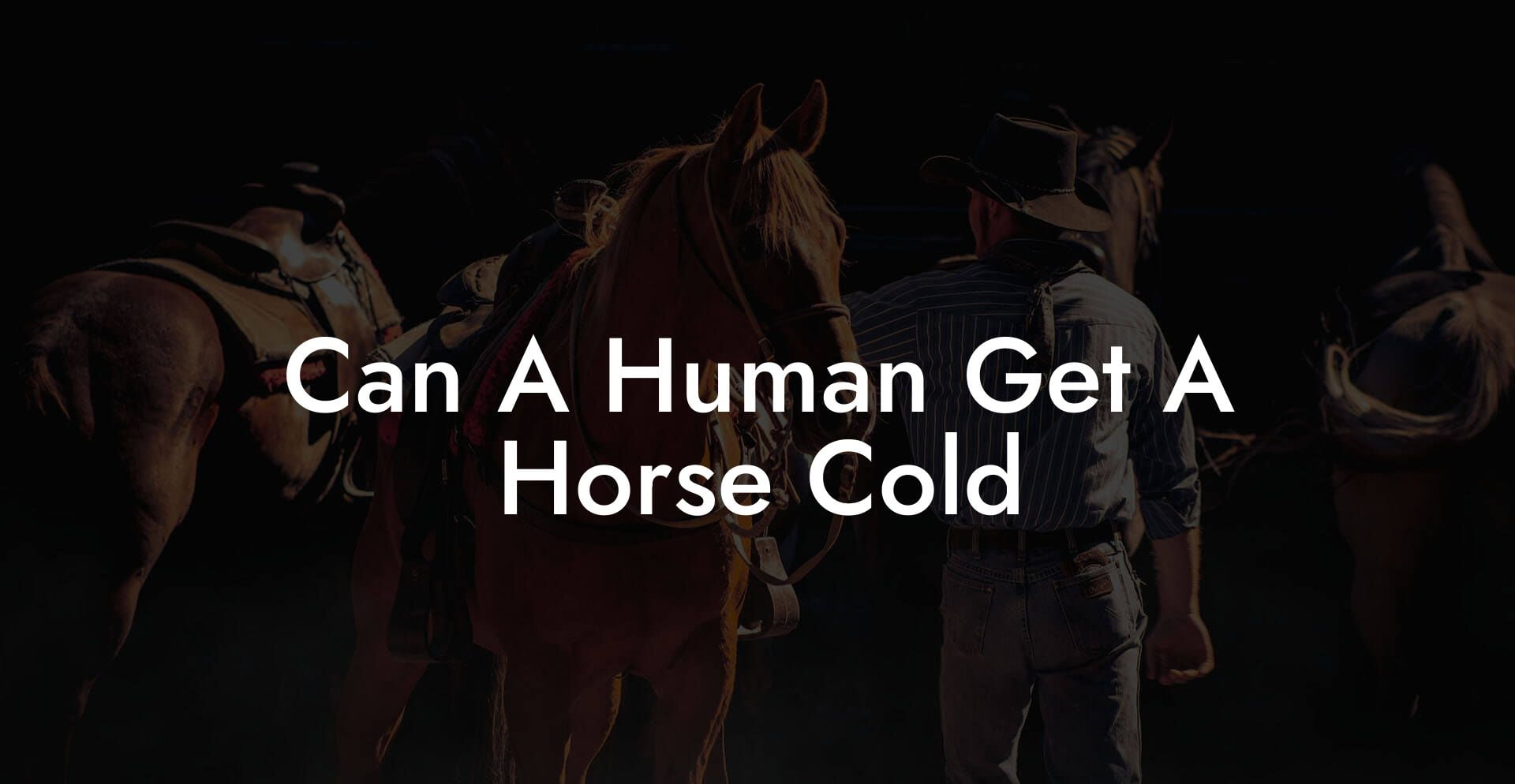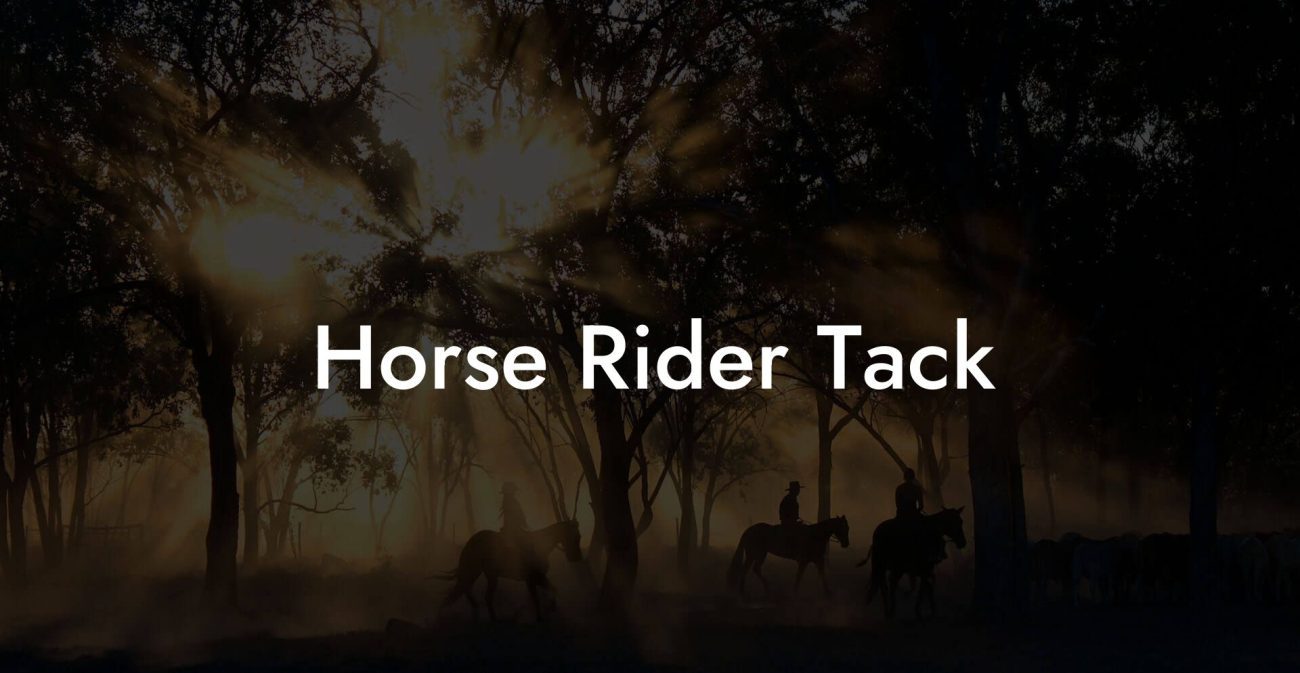Ever wondered if your next sneeze could actually be a case of "horse cold"? Before you start Googling your symptoms and comparing them to your favorite equine pals, let’s dive into the quirky, fascinating, and sometimes downright bizarre world where human and horse illnesses intersect. Spoiler alert: while horses might get colds too, it turns out that the chance of you catching one is as rare as a unicorn on a skateboard!
Quick Links to Useful Sections
- Understanding the "Horse Cold": More Than Just a Myth
- Demystifying Equine Respiratory Infections
- Equine Influenza: The Fast-Moving Flu
- Equine Herpesvirus (EHV): Not Your Average Cold
- Other Respiratory Agents in Horses
- Humans vs. Horses: The Biology of Viruses Explained
- Transmission Mechanics: How Respiratory Viruses Spread Among Horses
- Airborne Transmission
- Fomite Transmission
- Mythbusting: Can a Human Really Get a Horse Cold?
- How to Safeguard Your Human Health Around Horses
- Maintain Personal Hygiene
- Stay Up-to-Date on Vaccinations
- Mind Environmental Cleanliness
- Be Informed and Observant
- Scientific Insights: Research and Real-World Data
- Integrating Equine Health with Modern Living
- Precautions for Horse Owners and Caregivers
- Biosecurity Practices
- Personal Protective Measures
- Case Studies: Learning from the Field
- Case Study 1: The Outbreak at the Local Stables
- Case Study 2: The Backyard Horse Haven
- Case Study 3: The Veterinary Clinic’s Approach
- Resources and Community Support: Your Next Steps
- Frequently Asked Questions About Horse Colds and Zoonotic Risks
- Embracing the Equine Connection: A Final Word on Health and Humor
Understanding the "Horse Cold": More Than Just a Myth
When we talk about a “horse cold,” we’re typically referring to a range of respiratory infections that affect horses. Common culprits include equine influenza and conditions that mimic the symptoms of a human cold, such as nasal discharge, coughing, and general lethargy. But before you imagine your horse sneezing into your latte, let’s unpack what these infections really are.
Horses, like us, can catch respiratory viruses, but their immune systems and biology are uniquely adapted to their species. Equine influenza, for example, is caused by specific strains of the influenza virus that primarily infect horses. Just as humans have their seasonal colds and flu strains, horses have theirs. However, unlike the common cold that might send you to bed with tissues scattered around, the symptoms in horses often call for rest, isolation, and sometimes even a trip to a specialized veterinarian.
The big question, of course, is: can a human actually get a horse cold? The short answer is no – at least, not in the way you think. While some infectious diseases can cross species, most of the common pathogens that cause respiratory issues in horses are highly species-specific. That means you’re unlikely to catch your buddy’s sniffles, even if you’re hanging out in the barn all day.
Demystifying Equine Respiratory Infections
For those of you who love deep dives, let’s stroll through the stable of equine respiratory infections. Horses face a slew of pathogens, and understanding their biology helps clarify why cross-species transmission is uncommon.
Equine Influenza: The Fast-Moving Flu
Equine influenza is one of the most notorious respiratory illnesses in horses. Characterized by fever, a dry cough, nasal discharge, and a noticeable drop in performance (a heartbreaker for competitive riders), this virus spreads rapidly among horses in close quarters. Despite its name, equine influenza is caused by viruses that are distinct from the strains that affect humans. This is why, even if you spend every weekend at the stables, you’re not at risk of catching this flu.
Thanks to a robust vaccination program in many horse communities, outbreaks have become less frequent. However, when outbreaks do occur, they can be a major concern for horse owners and the equestrian industry. Understanding the mechanics behind the virus, and the reasons it won’t jump from horse to human, can help dispel myths and encourage informed conversations about animal health and biosecurity.
Equine Herpesvirus (EHV): Not Your Average Cold
Another player in the equine respiratory drama is Equine Herpesvirus (EHV). Unlike the typical cold virus, EHV can sometimes lead to neurological complications in horses. While there are several strains of EHV, only a few are associated with respiratory disease. Once again, this virus is highly adapted to horses, and although there have been rare cases where researchers observed minimal transmission indicators in controlled settings, the risk to humans remains virtually nonexistent.
The study of EHV is a great reminder that while viruses can adapt and evolve, the complex relationship between host species creates natural boundaries. So, while your horse might be having a rough day with a bout of EHV, you’re not in danger of catching it at your local coffee shop.
Other Respiratory Agents in Horses
Beyond the headline-grabbing viruses, horses can experience respiratory issues from bacterial infections, allergic reactions, and even environmental irritants like dust and pollen. These conditions can mimic the signs of a “cold” but are generally managed with supportive care, proper stable ventilation, and, when necessary, targeted medical treatments.
What ties all these together is the remarkable specificity of pathogens to their hosts. This means that while you might share a cold with your best friend after a long night out, you’re unlikely to swap viruses with your horse even if you’re cuddling up together in the barn.
Humans vs. Horses: The Biology of Viruses Explained
Let’s get nerdy for a minute: why can’t your human body just pick up a horse cold? The answer lies in the intricate world of cellular receptors and immune system compatibility. Viruses have evolved to latch onto specific proteins on the surfaces of cells. In horses, the configuration of these receptors is different enough to essentially block a human virus from taking hold, and vice versa.
Take influenza viruses, for instance. The strains that infect horses are designed to navigate the unique cellular landscapes of equine respiratory tracts. Your own immune system is tuned to deal with human pathogens that have evolved alongside you, not those tailor-made for a creature with hooves and a mane. It’s like trying to fit your favorite pair of sneakers on a centaur, you’re just not built for it!
This evolutionary specialization is one of nature’s ways of keeping species safe from each other’s bugs. Even in the rare instances where zoonotic diseases occur (think avian flu or some coronaviruses that make the headlines), rigorous research and biosecurity measures ensure that the risk is minimized.
So, while your horse might occasionally blow its nose in a way that seems oddly contagious, your unique human biology acts as a reliable barrier against equine-specific viruses.
Transmission Mechanics: How Respiratory Viruses Spread Among Horses
Understanding the transmission of respiratory viruses in horses gives us insight into why these infections are often called “horse colds.” In equine settings, close contact, shared water sources, and even aerosols in the stable can facilitate the spread of viruses like equine influenza.
When a horse with a cold coughs or sneezes, tiny droplets containing the virus are expelled into the air. Other horses, especially those with a sensitive constitution or compromised immune systems, may then inhale these droplets. This is why outbreaks can sometimes occur in environments where horses are in close quarters, such as training facilities or shows.
Airborne Transmission
Airborne transmission is the primary mode for many equine respiratory infections. However, the same mechanism usually doesn’t affect humans because the virus strains aren’t equipped to bind to the receptors in our upper respiratory tract. So while it might be viral party time for horses, it’s more like a closed club for us.
Fomite Transmission
Fomites, or contaminated objects, can sometimes play a role. If a virus lands on shared equipment such as grooming tools or even water troughs, it could theoretically be passed from one horse to another. But again, these viruses are so species-specific that even if you touch the same equipment, your chances of acquiring a “horse cold” are next to none.
Maintaining excellent hygiene in stables not only protects your equine friends but also gives you peace of mind knowing that you’re following best practices for animal care.
Mythbusting: Can a Human Really Get a Horse Cold?
Let’s address the elephant in the room (or should we say, the horse in the barn): is it possible for humans to catch a horse cold? The overwhelming consensus in the veterinary and medical communities is that the risk is virtually non-existent. The pathogens responsible for equine respiratory infections are highly adapted to their hosts and don’t easily cross the species barrier.
This isn’t just a ploy to keep horse lovers calm either, numerous studies and decades of research confirm that while some zoonotic diseases can jump between species, the typical “cold” viruses in horses are not among them. So, while you might get a sniffle from your human buddies, you’re not going to start sneezing out hay.
That said, the world of zoonotic diseases is complex. There are some cases where cross-species transmission has occurred, but these are exceptions rather than the rule. Influenza A viruses are one such example, as they occasionally undergo genetic shifts that can lead to zoonotic potential. However, these instances are closely monitored by both animal and human health agencies, ensuring that any potential threat is contained quickly.
For the vast majority of horse owners and enthusiasts, understanding that your four-legged friend’s cold is not your cold is a comforting realization. Proper biosecurity practices and routine veterinary care are your best bet for ensuring both you and your horse remain in prime health.
How to Safeguard Your Human Health Around Horses
While the risk of catching a horse cold is minimal, that doesn’t mean you should disregard general health precautions when working and playing with horses. A proactive approach not only protects you but also helps maintain the overall well-being of your equine companions.
Maintain Personal Hygiene
Whether you’re a lifelong equestrian or a weekend trail rider, good hygiene is key. Washing your hands after handling horses, grooming equipment, and visiting the stables can prevent the spread of various pathogens, even those that affect humans. Keep a small bottle of hand sanitizer in your saddle bag for quick clean-ups on the go.
Stay Up-to-Date on Vaccinations
While you don’t need a vaccine for a horse cold, staying current with your seasonal flu shot and other recommended immunizations can help bolster your immune system against common respiratory viruses. It also sets a great example for community health practices among fellow horse enthusiasts.
Mind Environmental Cleanliness
Clean stables and proper ventilation projects benefit horses and humans alike. Dust, mold, and bacterial contaminants can exacerbate respiratory issues, so regular cleaning routines and ensuring that your stables have proper air circulation will go a long way in keeping infections at bay.
Be Informed and Observant
It pays to be vigilant about the health of your horses. Familiarize yourself with the common symptoms of equine respiratory infections, and monitor changes in behavior, appetite, or performance. Quick intervention not only helps your horse recover faster but also minimizes the risk of a stable-wide outbreak.
Equipped with knowledge and a proactive approach, you can confidently navigate the barn without worrying about catching a horse cold, or any other equine-specific illness.
Scientific Insights: Research and Real-World Data
The study of zoonotic diseases is a dynamic field where cutting-edge research meets real-world experiences. Scientists continuously monitor viruses across species lines to ensure that potential risks are identified early. In the case of equine respiratory infections, decades of research have demonstrated that the viruses are largely species-specific.
International health organizations, such as the World Organisation for Animal Health (OIE) and the Centers for Disease Control and Prevention (CDC), work hand-in-hand with veterinary professionals to keep tabs on any emerging threats. Even in situations where human and equine populations have been in close contact, the data consistently supports that common equine viruses do not adapt easily to infect humans.
This research not only reassures horse owners but also provides valuable insights that help improve vaccination strategies, management practices, and outbreak response protocols for veterinarians and researchers worldwide.
The cutting-edge genomic technologies in use today allow scientists to decode viral mutations in real time. Such studies have confirmed that the receptors in equine respiratory systems differ significantly from those in humans, reinforcing the natural species barrier. Armed with these insights, experts continue to push for improved biosecurity and tailored health protocols that keep both horses and humans safe.
Integrating Equine Health with Modern Living
The rise of modern digital culture means that information is at your fingertips 24/7, and that’s a double-edged sword when it comes to health advice. On one hand, you have access to scientific studies and expert opinions; on the other, myths can spread like wildfire across social media platforms. As a Gen-Z or millennial horse enthusiast, it’s crucial to strike a balance by looking to reputable sources when it comes to equine care.
Platforms like veterinary association websites, academic journals, and even trusted equestrian blogs offer accurate, up-to-date information on topics ranging from equine influenza outbreaks to best practices for stable management. Engaging in online communities also provides a welcoming space for sharing experiences, asking questions, and staying informed about the latest research – all while enjoying a few laughs over the absurdity of catching your friend’s “horse cold.”
Remember, while meme culture can make light of many serious topics, when it comes to health, whether human or equine, solid facts always triumph over urban legends.
Precautions for Horse Owners and Caregivers
Your relationship with your horse is built on trust, care, and a mutual understanding that sometimes, life in the barn isn’t as glamorous as it looks on Instagram. And while you’re not at risk for catching a horse cold, keeping your equine companions healthy is a responsibility you don’t want to take lightly.
Biosecurity Practices
A robust biosecurity protocol is essential for any stable. Here are some top tips to ensure that your barn remains a safe haven:
- Quarantine New Arrivals: Any new horse entering your environment should be quarantined for a minimum of two weeks to monitor for signs of illness.
- Regular Cleaning: Implement a strict cleaning schedule for stalls, equipment, and common areas to minimize pathogen spread.
- Vaccination Protocols: Work with your veterinarian to ensure that all horses are up-to-date on vaccinations, including those for equine influenza and EHV.
- Limit Visitor Exposure: Be cautious with visitors, especially during outbreaks. Request that they practice hand hygiene and, if possible, wear protective clothing.
These measures not only keep your horses healthy but also maintain a hygienic and safe environment for everyone involved.
Personal Protective Measures
Even if you’re not at risk for equine-specific viruses, taking simple steps like wearing a mask in dusty environments, keeping your hands clean, and avoiding close face-to-face contact when a horse is sneezing can help ward off any pesky human colds or allergies.
Combining these personal precautions with the biosecurity standards at the stables creates a layered defense system, one that ensures both you and your horses live your best, healthiest lives.
Case Studies: Learning from the Field
Real-world examples often provide the best insights into the nuances of animal and human health interactions. Let’s look at a few case studies that shed light on common scenarios in equine care and the measures taken to maintain a healthy environment.
Case Study 1: The Outbreak at the Local Stables
At a popular local riding facility, an outbreak of equine influenza had the potential to disrupt the entire season’s schedule. Thanks to a well-implemented vaccination protocol and strict biosecurity measures, the outbreak was contained quickly. The facility’s proactive approach ensured that while several horses experienced mild respiratory symptoms, there was no cross-species transmission, and riders were kept at minimal risk. This case highlights the importance of communication, continual monitoring, and rapid response when managing equine illnesses.
Case Study 2: The Backyard Horse Haven
Consider the scenario of a dedicated horse owner who kept a couple of horses at a rural property. Despite minimal contact with other horses, one of the horses developed a respiratory infection after coming into contact with a stray wild horse. The owner, well-informed and cautious, quarantined the affected horse, improved stable hygiene, and called in a veterinarian immediately. As a result, the infection cleared up without significant spread, and the owner's informed actions reaffirmed that while equine infections can occur unexpectedly, responsible care practices can effectively mitigate risks.
Case Study 3: The Veterinary Clinic’s Approach
In a veterinary clinic specializing in equine care, a series of respiratory infections were reported among incoming equine patients. The clinic implemented a multi-pronged strategy that included isolating ill horses, ramping up sanitation protocols, and providing clear guidance to horse owners on post-visit care. The strategy not only minimized the outbreak within the clinic but also served as an excellent model for other facilities on how to manage potential cross-contamination scenarios.
These case studies underscore the importance of vigilance, proper hygiene, and swift response when dealing with respiratory infections in horses. They also serve to remind us that while the pathogens remain species-specific, the overall principles of disease control, prevention, early detection, and proper care, are universal.
Resources and Community Support: Your Next Steps
So, you’ve learned that while your horse might catch a cold, you’re safe from the equine version of it. Now, what’s next? Whether you’re a seasoned horse owner or a newcomer eager to learn, tapping into reliable resources and a supportive community is crucial for navigating the often complex world of equine health.
Here are some key resources and communities where you can deepen your knowledge and share experiences:
- Veterinary Associations: Organizations like the American Association of Equine Practitioners (AAEP) provide up-to-date research, best practices, and guidelines for managing equine health.
- Local Equine Clubs and Forums: Whether online or in-person, these communities are treasure troves of practical tips, personal stories, and mutual support.
- Academic Journals: Publications dedicated to veterinary science offer peer-reviewed articles and studies that explore the latest findings in equine medicine and infectious diseases.
- Social Media Groups: From Facebook groups to Reddit threads, joining a community of horse lovers can give you real-time advice and foster a sense of camaraderie.
- Workshops and Webinars: Many organizations offer regular training sessions on equine care, biosecurity, and stable management. These events are a great way to stay informed while networking with experts and fellow enthusiasts.
By engaging with these resources, you’ll not only learn more about how to keep your horse happy and healthy but also contribute to a community that values evidence-based practices and a down-to-earth approach to equine care.
Whether you’re troubleshooting a mild cough in your stable or planning a comprehensive health program for your equine athletes, tapping into these networks will set you on the right path.
Frequently Asked Questions About Horse Colds and Zoonotic Risks
We know you have questions. Here are some of the most commonly asked questions, answered in a way that cuts through the nonsense and gets straight to the point.
1. What exactly is a "horse cold"?
A “horse cold” typically refers to respiratory infections in horses, such as equine influenza, which cause symptoms like coughing, nasal discharge, and low energy. These infections are species-specific and do not pose a risk to humans.
2. Can a human catch a cold from a horse?
No, humans cannot catch a “horse cold.” The viruses that cause respiratory infections in horses are adapted to their unique immune system and cell receptors, making cross-species transmission extremely unlikely.
3. Are there any documented cases of zoonotic transmission from horses to humans?
While zoonotic diseases do exist, the respiratory viruses commonly found in horses, such as equine influenza and EHV, are not known to infect humans under normal circumstances.
4. What precautions should I take when handling horses?
Maintain good personal hygiene, ensure regular cleaning and proper ventilation in stables, and follow biosecurity guidelines such as quarantining new arrivals. These practices protect both you and your horses.
5. How can I tell if my horse has a respiratory infection?
Look for signs like coughing, nasal discharge, a drop in energy or appetite, and sometimes a mild fever. Consulting a veterinarian for an accurate diagnosis is always a safe bet.
6. Is equine influenza the same as seasonal flu in humans?
Not at all. Equine influenza is caused by viruses that are specific to horses, whereas human seasonal flu is caused by different strains that are adapted to human biology.
7. Do I need to worry about getting infections while visiting a stable?
While it’s always wise to practice good hygiene, the risk of catching a pathogen directly from horses is minimal if proper biosecurity measures are in place.
With research continually confirming the species-specific nature of equine respiratory infections, you can focus on enjoying your time with horses without an added worry about catching “horse colds.”
Embracing the Equine Connection: A Final Word on Health and Humor
At the end of the day, the joy of interacting with horses comes from feeling connected to these majestic animals. Their spirited personalities and undeniable charm often brighten our days, even if they’re occasionally under the weather. Knowing that you’re not at risk of catching a “horse cold” can free you up to enjoy every ride, every brush, and every moment spent in the barn without fear.
With scientific research firmly on our side and a wealth of resources at your fingertips, you can confidently care for your horse, engage with a supportive community, and laugh off any unfounded fears. Your health, and your horse's health, is in your hands, and a little knowledge goes a long way in ensuring that every day at the stable is as joyful as it is safe.
So next time you see your horse give you a knowing glance (or a suspicious sniff), rest assured that while they might be battling their own seasonal bugs, you’re free to keep enjoying the ride, the humor, and the unique bond that only a horse and rider can share.
Embrace the fun, the facts, and the holistic approach to equine and human well-being. After all, whether it’s a human cold or a horse cold, the best remedy is staying informed, staying safe, and never losing sight of the joy that comes from caring for these magnificent creatures.













